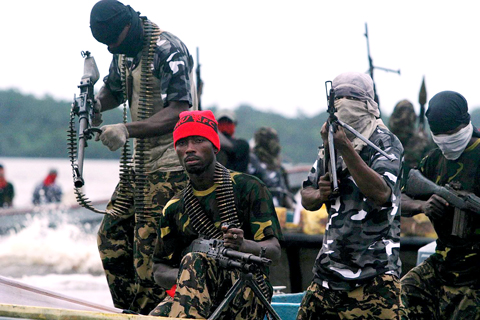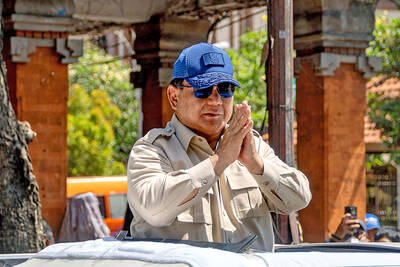Nigeria’s main armed militant group said yesterday it had destroyed a major pipeline run by Royal Dutch Shell in the sixth such attack in the past week as it vowed to paralyze the key oil sector.
The Movement for the Emancipation of the Niger Delta (MEND), the main group fighting for a greater share of southern Nigeria’s oil wealth for local people, said the attack took place on Friday on a “major pipeline” in Rivers State.
It said the pipeline was located at Buguma Front in the Asari Toru region and was the latest target of the “oil war” it launched on Sunday and has nicknamed “Hurricane Barbarossa.”

PHOTO: EPA
“The military and the government of Nigeria whose unprovoked attack on our position prompted this oil war are no match for a guerrilla insurgency of this kind,” it said.
MEND yesterday vowed to “continue to nibble every day at the oil infrastructure in Nigeria until the oil exports reach zero.”
Earlier last week, Shell confirmed the first attack on its Alakiri flow station and a second on the Greater Port Harcourt Swamp Line, both on Monday.
As the week went on it became more tight-lipped, neither confirming or denying claims of attacks on its Orubiri flow station, Rumuekpe pipeline and another pipeline at the Elem-Kalabari Cawthorne Channel axis in Rivers state.
Chevron meanwhile has confirmed two “shooting incidents” near its facilities while saying it has no reason to believe it was specifically targeted in either attack. MEND, which has cut Nigeria’s oil output by more than one quarter since it first emerged in 2006, on Sunday declared “war” on the oil industry, in what it said was a response to an attack by the Nigerian army on its positions. It has threatened to spread its raids to neighboring states.
On Wednesday, in a rare daylight attack, MEND said it had blown up a major pipeline, which it said it believed belongs to Shell and to Agip of Italy.
One of the main grouses of MEND is that the oil wealth of Nigeria, one of Africa’s top petroleum exporters, is basically enjoyed by the federal government and only a fraction of it trickles down to the locals.
It also accuses oil companies of damaging the environment.
MEND spokesman Jomo Gbomo claimed yesterday to have grassroots support.
“The impoverished and neglected inhabitants of oil producing communities consider our actions to these structures as good riddance to bad rubbish,” he said.
“Oil exploration has brought only pain to them by way of environmental damage [farmlands, fishing and wild life sanctuaries], harassment from the military and rape of under-aged girls by soldiers, extra-judicial killings of young men and development and wealth to other parts of the country at their detriment,” Gbomo said.

DEADLOCK: Putin has vowed to continue fighting unless Ukraine cedes more land, while talks have been paused with no immediate results expected, the Kremlin said Russia on Friday said that peace talks with Kyiv were on “pause” as Ukrainian President Volodymyr Zelenskiy warned that Russian President Vladimir Putin still wanted to capture the whole of Ukraine. Meanwhile, US President Donald Trump said that he was running out of patience with Putin, and the NATO alliance said it would bolster its eastern front after Russian drones were shot down in Polish airspace this week. The latest blow to faltering diplomacy came as Russia’s army staged major military drills with its key ally Belarus. Despite Trump forcing the warring sides to hold direct talks and hosting Putin in Alaska, there

North Korea has executed people for watching or distributing foreign television shows, including popular South Korean dramas, as part of an intensifying crackdown on personal freedoms, a UN human rights report said on Friday. Surveillance has grown more pervasive since 2014 with the help of new technologies, while punishments have become harsher — including the introduction of the death penalty for offences such as sharing foreign TV dramas, the report said. The curbs make North Korea the most restrictive country in the world, said the 14-page UN report, which was based on interviews with more than 300 witnesses and victims who had

COMFORT WOMEN CLASH: Japan has strongly rejected South Korean court rulings ordering the government to provide reparations to Korean victims of sexual slavery The Japanese government yesterday defended its stance on wartime sexual slavery and described South Korean court rulings ordering Japanese compensation as violations of international law, after UN investigators criticized Tokyo for failing to ensure truth-finding and reparations for the victims. In its own response to UN human rights rapporteurs, South Korea called on Japan to “squarely face up to our painful history” and cited how Tokyo’s refusal to comply with court orders have denied the victims payment. The statements underscored how the two Asian US allies still hold key differences on the issue, even as they pause their on-and-off disputes over historical

CONSOLIDATION: The Indonesian president has used the moment to replace figures from former president Jokowi’s tenure with loyal allies In removing Indonesia’s finance minister and U-turning on protester demands, the leader of Southeast Asia’s biggest economy is scrambling to restore public trust while seizing a chance to install loyalists after deadly riots last month, experts say. Demonstrations that were sparked by low wages, unemployment and anger over lawmakers’ lavish perks grew after footage spread of a paramilitary police vehicle running over a delivery motorcycle driver. The ensuing riots, which rights groups say left at least 10 dead and hundreds detained, were the biggest of Indonesian President Prabowo Subianto’s term, and the ex-general is now calling on the public to restore their